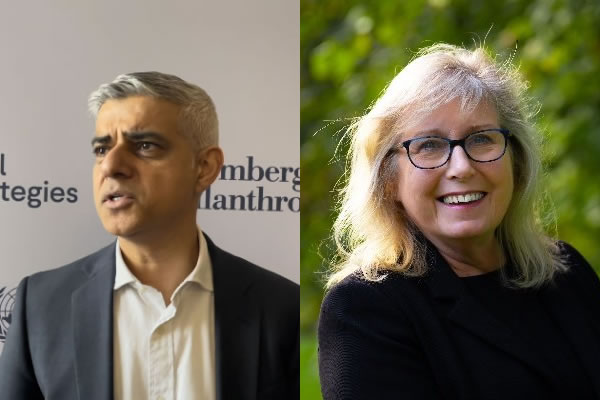London Mayoral Election Less Than 100 Days Away
13 candidates have so far said they will be standing

Mayor Sadiq Khan and Conservative contender Susan Hall AM
January 27, 2024
Last Tuesday (23 January) marked 100 days until the London mayoral election on Thursday, May 2.
The election will see Labour mayor Sadiq Khan attempt to win an historic third term at City Hall – a feat no previous mayor has ever achieved. His main opponent, the Conservative candidate Susan Hall, has vowed to stop him, and would also make history as London’s first female mayor.
Thirteen candidates have so far been declared as standing, though we won’t know the final number until nominations close in a couple of months’ time. The full list of names is expected on Thursday, March 28.
Each of those candidates will have paid a £10,000 deposit to be on the ballot paper. They only get that money back if they receive at least five per cent of the vote. At the last mayoral election in 2021, there were a record 20 candidates.
Over the next few weeks, Mr Khan will finalise his budget proposals for the coming year. This is a process which happens every year, but ahead of an election, it’s effectively saying ‘These are the areas I will be allocating money towards if I am re-elected’.
Ms Hall has meanwhile been holding back on making detailed commitments as to what she would spend money on, until the mayor has published that final budget – so once he’s done that at the end of February, she will start to set out her stall on a much wider range of policies.
In 2021, Mr Khan published his manifesto about a month before the election. The Tory candidate in that contest, Shaun Bailey, published his just two and a half weeks before the vote.
This election will be London’s first mayoral contest to use the first past the post voting system, meaning that the winning candidate simply has to receive more votes than any other. Mayors were previously elected using the supplementary vote system, which meant Londoners were able to give a first and second preference.
Finally, it’s worth remembering that elections to the London Assembly will be happening on the same day as the mayoral contest.
The Assembly has 25 members and exists to hold the mayor to account, by scrutinising their policies and actions. It currently has 11 Labour members, nine Conservatives, three Greens and two Liberal Democrats.
Labour will be hoping to keep control of at least a third of the seats, which effectively gives them the balance of power, while smaller parties like Reform UK – previously known as the Brexit Party – will be hoping to win representation on the Assembly for the very first time.
Noah Vickers - Local Democracy Reporter